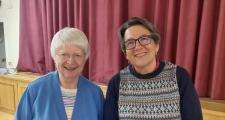‘Still the same kind, modest and accepting social worker who supported me 50 years ago’

It’s one of the perennial questions at the back of every social worker’s mind: what happens to the people they support? How do their lives shape up after intervention ends?
Retired social worker Hazel Luscombe recently got to find out through a chance reconnection with Fran, a former foster child she supported in the 70s.
The reunion came about quite unexpectedly, as Hazel explains: “Two years ago, when the latest issue of the Women’s Institute magazine WI Life arrived, I turned to the book reviews, being a keen reader.
“There I read about Cuckoo in the Nest by Fran Hill.”
It was a name she recognised from a long time ago, and she found herself wondering: “Had I been her social worker way back in the 1970s? I checked a wedding photo from 1982 (the last time I saw Fran) to remind me of her married name.
“In some trepidation, I messaged Fran and was surprised and delighted to receive her reply within a couple of hours.”
It turned out that Fran, who also featured in PSW magazine when Cuckoo in the Nest was published, was indeed the same person that Hazel had worked with 50 years ago.
Fran’s birth mother had struggled to cope, experiencing alcohol dependency and having four children by the age of 22.
When Fran's father left, things deteriorated and she and her siblings were each placed in temporary foster placements. It was the last of these that became permanent, around the time Fran was 14, after her birth mother died.
Fran left school at 16 but returned to education in later life, obtaining a first-class degree in English literature. After becoming a teacher she turned to writing.
Cuckoo in the Nest deals with the theme of fostering and Fran drew on her own experiences of foster care in the 1970s. The book was featured on BBC Radio 4's Woman's Hour and was a runner-up for the Paul Torday Memorial Prize.
It tells the story of Jackie Chadwick, a teenager newly arrived with a foster family, and is set in the summer of 1976, the year Fran was permanently fostered.
It was at this point in her own fostering journey that Fran and her social worker parted company, after Hazel had supported Fran over several years.
Hazel remembers how her first tentative message led to the rebuilding of a relationship so formative for Fran all those years ago.
“We exchanged messages for several months before meeting for coffee and, later, for lunch, having discovered that we lived in neighbouring towns,” said Hazel.
“How wonderful to hear the story of Fran's life and all her achievements, having overcome a stressful and disrupted childhood.”
Fran went on to give a talk at Hazel’s local WI branch, and Hazel adds: “Social workers often wonder how things turn out for the children and families they try to help.
“Fran has indeed triumphed over adversity and it has been both a pleasure and a privilege to meet up with her after all these years.”
For Fran, being reunited with Hazel brought back memories of a positive presence during a difficult time in her life: “Hazel 50 years later is still as I remember her: kind, modest and accepting. It's been a blessing to be reunited with someone who brought those qualities to bear on my family's behalf all those years ago.”
During the reunion, Fran gave Hazel a copy of her book and later posted a photo of them together on social media with a message saying: “Thank you Hazel and ALL the social workers. You change lives.”
The sequel Home Bird was published earlier this year and also draws on Fran's experiences in foster care. A third book in the series is planned.
